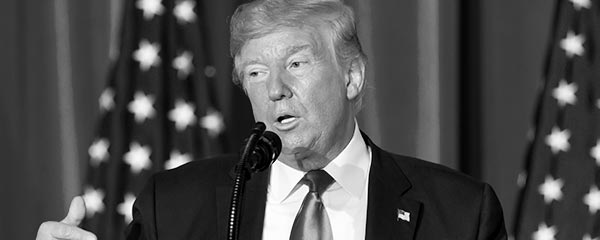PRINCETON, NJ -- As Barack Obama prepares to give his first State of the Union address as president, a review of Gallup historical data suggests these speeches rarely affect a president's public standing in a meaningful way, despite the amount of attention they receive. Among recent presidents, only Bill Clinton seemed to reap a public-opinion benefit from the yearly ritual, with an average 3 percentage-point increase across his seven State of the Union speeches.
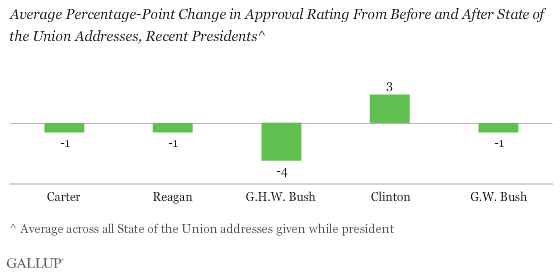
Clinton's 1998 State of the Union speech is notable for the sharp increase in his approval rating that followed. Just prior to the Jan. 27, 1998, speech, a Jan. 25-26 Gallup poll found 59% of Americans approving of the job Clinton was doing as president. The next Gallup update on his approval rating, conducted Jan. 30-Feb. 1 of that year, found 69% of Americans approving of Clinton.
In that speech, Clinton announced that the federal budget was balanced and was able to tout a strong economy. The speech is also notable because it was given just days after news broke of his alleged affair with former White House intern Monica Lewinsky.
"Audiences for the State of the Union tend to be heavily tilted toward the president's existing supporters."
But Clinton's 1996 State of the Union speech -- which may have served as the unofficial kickoff for his re-election campaign that year -- also seemed to have a positive impact on Americans' views of his performance as president, with his approval rating increasing from 46% pre-speech to 52% post-speech.
The only other example Gallup has found of a substantial increase in approval surrounding a State of the Union address was for George W. Bush in 2005. After his Feb. 2 address that year, his approval rating increased from 51% in mid-January to 57% in a Feb. 4-6 Gallup poll. But that increase also coincided with successful democratic elections in Iraq on Jan. 30 of that year, so it is not clear the increase was due to the State of the Union.
The following table shows the pre- and post-State of the Union approval ratings for all presidents back through Jimmy Carter. Across all presidents, the average change in approval has been less than a one percentage-point decline.
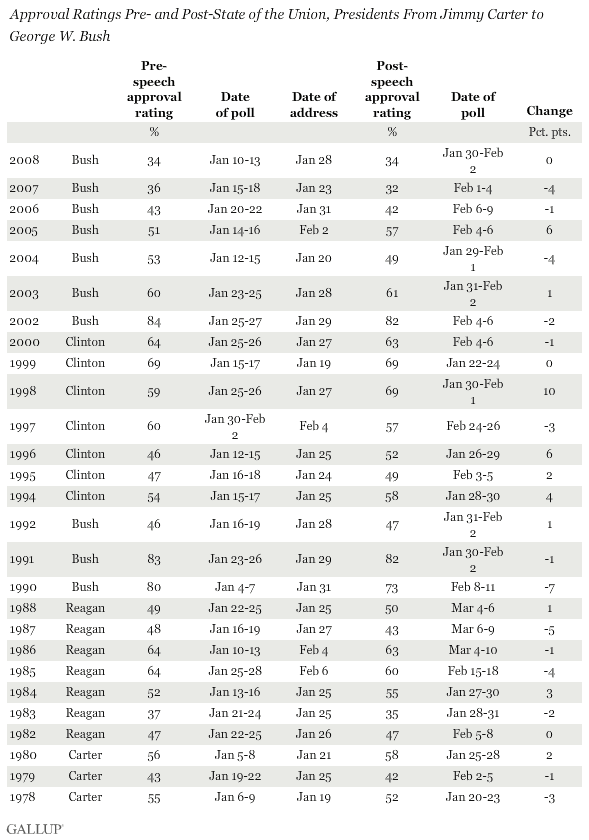
Obama's Wednesday's speech will be his first official State of the Union but the third time he will address a joint session of Congress. Obama's first address to a joint session of Congress took place early in his term, last Feb. 24, and focused on his economic plans. His approval rating, based on Gallup Daily tracking, improved by a notable eight percentage points after that speech, going from a then-personal low of 59% in the three days leading up to the speech to 67% in the three days immediately following.
In the second address, on Sept. 9, Obama addressed Congress in an attempt to shore up support for healthcare reform. The address may be remembered more for Republican Congressman Joe Wilson's shouting "You lie!" during the speech than for the substance of Obama's remarks. Obama's approval rating did not show any meaningful improvement after that address, going from 51% in the days leading up to the speech to 53% in the days immediately following.
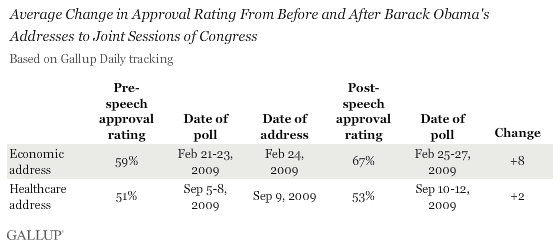
Obama is known for his rhetorical skills so there is a chance he can improve upon prior presidents' records after their State of the Union addresses. What is working against him, as was the case for other presidents, is that the audiences for the State of the Union tend to be heavily tilted toward the president's existing supporters.
After most State of the Union speeches from 1994 through 2006, Gallup conducted immediate-reaction polls among those who watched them. As much as 52% of the audience consisted of supporters of the president's party. Two exceptions to this general pattern were Clinton's 1995 and 1998 speeches, in which the party composition of the audience was similar to that for the general population.
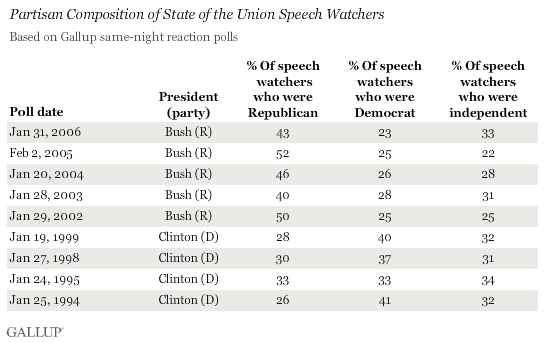
Bottom Line
President Obama's first State of the Union speech comes at a time when his approval ratings are below the majority level. Thus, he has an opportunity to win back the support of some Americans who no longer approve of the job he is doing. Typically, presidents have not been able to capitalize on the opportunity the State of the Union presents. Obama's ability to do so may depend as much on getting his non-supporters to tune in as on the quality of the speech he gives.
